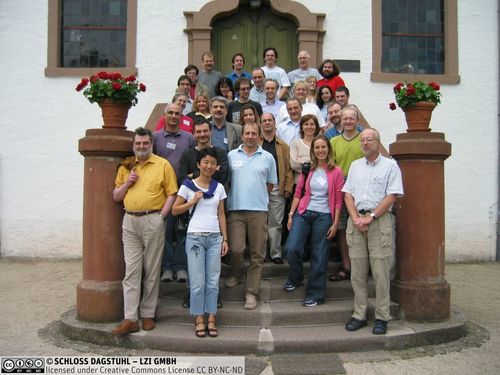Dagstuhl Seminar 04271
Preferences: Specification, Inference, Applications
( Jun 27 – Jul 02, 2004 )
Permalink
Organizers
- Gianni Bosi (Universitá di Trieste, IT)
- Ronen I. Brafman (Ben Gurion University - Beer Sheva, IL)
- Jan Chomicki (SUNY - Buffalo, US)
- Werner Kießling (Universität Augsburg, DE)
Contact
"Preference" is a fundamental notion in those areas of computer science, applied mathematics and philosophy that deal with decisions and choice. In Mathematical Decision Theory, preferences (often expressed as utilities) are used to model people's economic behavior. In Artificial Intelligence, preferences help to capture agents' goals. In Databases, preferences help in reducing the amount of information returned in response to user queries. In Philosophy, preferences are used to reason about values, desires, and duties. Surprisingly, there has been so far very little interaction between those areas. The difference in foci, as well as variations in terminology, make the results obtained in one area difficult to use in another.
This Dagstuhl seminar gathered researchers from many areas involving preferences (in particular databases, AI, mathematics, decision science, philosophy) in order to stimulate more specialized research in those areas and identify possible directions for collaboration. The following topics where covered during the seminar week.
Topics:
- Preference specification and representation
- Preference composition and merging
- Preference aggregation
- Axiomatic properties of preferences
- Logics of preference
- Topological/algebraic preference structures and their utility representation
- Linear and non-linear utility representations
- Preferences with intransitive indifference
- Preference elicitation and learning
- Preference revision
- Incomplete or inconsistent preferences
- Reasoning about preferences
- Priorities in reasoning, conflict resolution and belief revision
- Preference query languages
- Preference query evaluation and optimization
- Preference mining
- Preference repositories
- Preference-driven search engines
- Preference-driven human-computer interaction
- Recommendation systems and other e-commerce applications
- Constraints and preferences, "soft" constraints
- Preference logic programming
- Preference and choice
- Alternatives to preferences
This seminar was unanimously rated as very successful by all participants at the end of a wonderful stay in Dagstuhl. As a main result it was agreed to organize a successor event in the same multi-disciplinary mode. This follow-up event was held as "IJCAI-05 Multi-Disciplinary Workshop on Advances in Preference Handling" in conjunction with the International Conference on Artificial Intelligence IJCAI, July 31 - Aug. 1, 2005, in Edinburgh, Scotland. For 2006 this tradition will continue as as "ECAI-06 Multi-Disciplinary Workshop on Advances in Preference Handling", in conjunction with the European Conference on Artificial Intelligence ECAI in Riva del Garda, Italy, Aug. 28-29. 2006
- Elisabeth André (Universität Augsburg, DE) [dblp]
- Wolf-Tilo Balke (Leibniz Universität Hannover, DE) [dblp]
- Gianni Bosi (Universitá di Trieste, IT)
- Ronen I. Brafman (Ben Gurion University - Beer Sheva, IL) [dblp]
- Gerhard Brewka (Universität Leipzig, DE) [dblp]
- Maria Jesus Campion (Public University of Navarra, ES)
- Jan Chomicki (SUNY - Buffalo, US)
- Paolo Ciaccia (University of Bologna, IT)
- Pierangelo Dell'Acqua (Linköping University, SE)
- Carmel Domshlak (Technion - Haifa, IL) [dblp]
- Susanne Fuchs-Seliger (KIT - Karlsruher Institut für Technologie, DE)
- Norbert Fuhr (Universität Duisburg-Essen, DE) [dblp]
- Judy Goldsmith (University of Kentucky - Lexington, US) [dblp]
- Ulrich Güntzer (Universität Tübingen, DE)
- Gerhard Herden (Universität Duisburg-Essen, DE)
- Stefan Holland (Universität Augsburg, DE)
- Esteban Indurain (Public University of Navarra, ES)
- Ulrich Junker (ILOG - Valbonne, FR) [dblp]
- Souhila Kaci (CNRS - Lens, FR) [dblp]
- Klaus Keimel (TU Darmstadt, DE) [dblp]
- Werner Kießling (Universität Augsburg, DE)
- Georgia Koutrika (University of Athens, GR)
- Pierfrancesco La Mura (HHL Leipzig, DE) [dblp]
- Jérôme Lang (Paul Sabatier University - Toulouse, FR) [dblp]
- Klaus Mainzer (Univ. Augsburg, DE) [dblp]
- Ghanshyam Mehta (The University of Queensland - Brisbane, AU)
- Alessandra Mileo (University of Milan, IT) [dblp]
- Marc Pirlot (Faculté Polytechnique - Mons, BE) [dblp]
- Pearl Pu (EPFL - Lausanne, CH) [dblp]
- Francesca Rossi (University of Padova, IT) [dblp]
- Torsten Schaub (Universität Potsdam, DE) [dblp]
- Alexis Tsoukias (University Paris-Dauphine, FR) [dblp]
- Davy Van Nieuwenborgh (Free University of Brussels, BE)
- Kristen Brent Venable (University of Padova, IT) [dblp]
- Toby Walsh (Univ. of New South Wales - Sydney, AU) [dblp]
- Emil Weydert (University of Luxembourg, LU) [dblp]
- Nic Wilson (University College Cork, IE)


